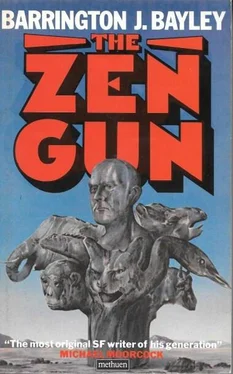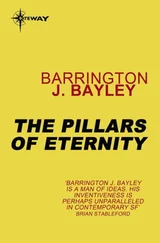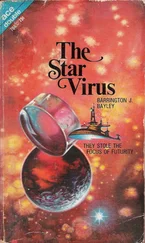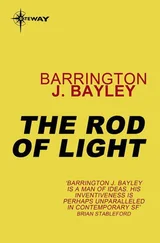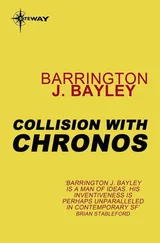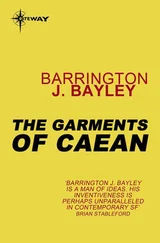A general-purpose corridor wagon, overladen with tools, bounced along behind the yelping, squealing beasts. The DAO cut the scene, glancing to Archier.
“I think we can take it repairs are proceeding, Admiral.”
“Now that’s the stuff to give them,” Gruwert pronounced. His little eyes swivelled to those who had invaded the bridge. “Get those layabout out of here!” he snorted loudly. “Go on, get out!”
The partygoers shuffled uncertainly, the girl stepping back from Archier. They seemed amazed by the behaviour of the animals on the vid-window, Likewise they were not accustomed to having a second-class citizen address them so.
Archier turned to face them. “Perhaps you had better leave,” he suggested politely. “We have our hands rather full at the moment.”
“Yes, of course, Admiral,” said a man, somewhat older than the others, after a pause. “Sorry if we’ve got in the way.”
He ushered the others out with placatory motions. At the door he suddenly turned round with a smile.
“Good luck with the battle!” he said brightly.
The capuchin monkey closed the door after him. By now the bridge had obtained contact with the rest of the fleet. On the vid-windows, the current assessment began to take shape.
The combat region had again expanded during the interim when the flagship had been unable to exercise control. Archier gave the order to contract the perimeter once more, to give Ten-Fleet the advantage of its gun range. At the same time he put a stop to the useless headlong flight.
But as the reports came in it became clear that the Escorians were already beaten; had, in fact, been doomed from the start to be beaten. Even with the partial success of their game plan—which had simply been to prevent Ten-Fleet from employing any fanciful tactics—even when fighting ship on ship or in small groups, even in the most favourable circumstances they could find, the terrible Imperial guns, the sheer size and power of the front-line-o’-warships that had emerged long ago out of Diadem, had taken their toll on them. They had been wiped out by the score. And now, as Ten-Fleet began yet again to gather itself together and take up one of the many geometrical dispositions outlined in the manuals, the opposition’s will to continue the conflict broke. It must have become clear to the Escorian commanders that they faced annihilation: those ships remaining—less than a third of the original force, many of them battered or even crippled—received the order to flee. They began to edge away from the area; then, like an exploding starburst, sped in all directions.
Archier put out a call; pursue. All surviving rebels were to be hunted down and destroyed, unless they managed to surrender first. In any case, it would now be necessary to distribute his ships all over Escoria. There was the final stage of putting down rebellion to be dealt with.
Besides which, he had an unfulfilled instruction: to find out about the weapon prophesied by Oracle. Possibly the rebels’ unexpected possession of feetol cannon was what Oracle referred to… but his duty remained to investigate the matter exhaustively.
He sighed. There was much work ahead. And while Gruwert snuffled and squealed in exultation, the humans of the command staff were subdued, as were the captains of other units that were appearing briefly on the new network.
For his Damage Assessment Officer was now collating the losses Ten-Fleet had suffered. And they were heavy. Over a quarter of Archier’s ships were gone, and thirty more reported damage varying from superficial to serious.
The Empire would not long sustain losses like these, he realised. Dolefully he listened to the list of names the officer read out to him. Each of them was like hearing the death of a friend; but one gave him particular pause.
“What was that again?” he queried.
“ Lilac Willow , sir, She took a direct hit in the seventh minute. The rebel responsible was subsequently destroyed.”
Archier pursed his lips. He was remembering Volsted Magroom. The little fellow had been appealing, in a way. Archier had liked him.
Well, he would know all about space battles now.
Once more Archier sighed. He wondered if the party would still be in progress when he had finished here. He could certainly use some relaxation.
It was with caution that the privateer approached the big, empty bulk of the Imperial warship. In the nose cabin that he used as a control room, Ragshok peered disbelievingly.
“ Claire de Lune ,” he murmured, reading the name on the ship’s side, among the Imperial blazon, the flags and ensigns painted there. “What the Simplex does that mean, Morgan?”
“I don’t know, chief. It’s some foreign language,” Morgan, a dark-haired, florid man, scratched his head perfunctorily.
“Take us in a bit closer,” Ragshok ordered.
“Yes, chief.”
The vessel loomed. She was not one of the fleet’s biggest ships, not a front-line—o’-war, but she was big enough. If Ragshok knew his ships—and ships was one thing he knew—she was a Planet Class destroyer. She loomed, lights still blazing, drive either idle or defunct… derelict.
Ragshok had watched the battle from a safe distance. He had hoped the rebels would win, naturally, but not overenthusiastically so. He was on the side of political stability because it made the pickings richer, but on the other hand it might lead to merchant ships being better armed and therefore less easy prey. He did not want to be a prospector again, hewing wealth from the natural environment, which was what he had been doing before he realised how wealthy space was with other people’s riches.
The latest news he had was that Ten-Fleet had nearly finished the job of hunting down remnants of the rebel fleet and was beginning to regather. It was easy to understand why Claire de Lune had been abandoned in the first place: she had taken damage, perhaps to her drive, perhaps to her defences or to her offensive weapons, that rendered her a sitting duck. “But why haven’t they come back to her?” he murmured.
“Think she’s just plasma by now, I expect,” Morgan said. “She ought to be, too.”
“Alright, let’s go over and have a look.”
He snapped down his helmet while Morgan went aft to rouse the others. A minute later a force forty strong was floating across the gap, drifting across the bulging, engineered cliff face of the other vessel until they found a port.
Inside, the air was good. Ragshok snapped open his helmet and smelled, with startlement, the sweet perfumes of the ship’s interior environment. Here, close to the hull, the surroundings were more businesslike and he did not see the luxurious furnishings that were later to amaze him.
But it was less than a minute before he realised the effect some of those perfumes were having on him. He gave a strangled cry of incredulity.
“Good grief , Morgan—they were taking drugs during a battle?”
His men spread out through the ship, each one having been briefed on what to find out. Ragshok made his way to the bridge; it was locked, and when he shot the door open, it had the appearance of being disused. Shortly, his ship’s engineer informed him that the ship had apparently been controlled from another place, a sort of command centre. He went there and played with the equipment while reports were brought to him.
The ship was holed, which he had not noticed while approaching, but not, seriously so. The emergency gels had kept her airtight, and it would not cost too much work to draw a new skin over the ruptured parts of the hull. The feetol engines were out of action, which was what caused her to be abandoned. But before leaving, her crew had spiked all the guns.
Читать дальше
